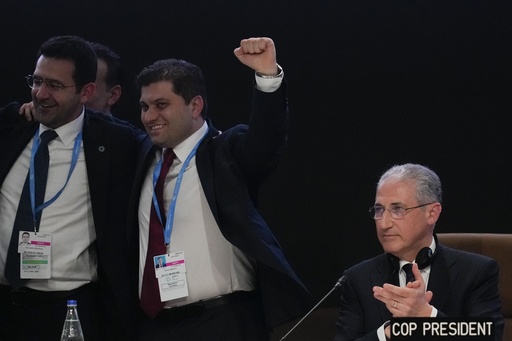BAKU, Azerbaijan — In the early hours of Sunday, nations across the globe found common ground at the United Nations climate conference, agreeing on a financial strategy for wealthier countries to aid poorer nations in their climate fight.
While the agreement is not without its flaws, it has sparked cautious optimism among some participants who see it as a forward-moving step.
Ani Dasgupta, the president and CEO of the World Resources Institute, characterized the deal as an “important down payment toward a safer, more equitable future,” but he emphasized that the most impoverished nations have every right to feel disheartened by the insufficient commitment from more affluent states, especially given the critical stakes involved for billions of lives.
The summit was initially scheduled to conclude on Friday but discussions extended into Sunday due to significant disagreements among countries. Tensions escalated as delegations attempted to bridge a vast divide in ambitions and expectations.
So, what does the climate finance agreement entail?
Rich nations have committed to generating at least $300 billion annually by 2035. Although this falls short of the requested $1.3 trillion needed by developing countries, some delegations are optimistic that this agreement marks progress and envision additional funding may follow in the years ahead.
The agreement includes provisions for collaborative efforts to harness “all public and private sources” in pursuit of the $1.3 trillion target by 2035. This suggests potential engagement from international mega-banks supported by taxpayer funding, with hopes for private sector investments to join the cause for climate initiatives.
Additionally, this deal represents a significant step for recipient nations aiming to set more ambitious targets for reducing greenhouse gas emissions due early next year. This aligns with efforts to implement new pollution reduction targets every five years, a framework established in the 2015 U.N. talks held in Paris.
The 2015 Paris agreement was designed to consistently increase global climate efforts to keep the rise in temperature under 1.5 degrees Celsius (2.7 degrees Fahrenheit) from pre-industrial levels. Currently, temperatures have already increased by 1.3 degrees Celsius (2.3 degrees Fahrenheit), with carbon emissions continuing to rise.
How will the allocated funds be utilized?
The Baku agreement replaces a prior commitment made 15 years ago that required wealthier nations to contribute $100 billion each year for climate finance in developing countries.
The newly established target aims to support a vast array of initiatives necessitated by a warming climate. This includes funding the transition to renewable energy sources while moving away from fossil fuels. Developing countries require substantial investment in the infrastructure needed to facilitate large-scale deployment of technologies such as wind and solar energy.
Moreover, communities affected by severe climatic events are seeking resources to adapt and prepare for future disasters like floods and wildfires. Funding could assist in improving agricultural practices to cope with extreme weather, redesigning homes to withstand storms, relocating residents from vulnerable areas, and enhancing emergency management plans.
To illustrate, the Philippines recently faced a series of six major storms within a month, devastating local communities with damaging winds, severe flooding, and destruction of homes and farmland. Esther Penunia from the Asian Farmers Association highlighted the urgent need for financial support for family farmers, some of whom have incurred extensive losses from storm damage.
She described the plight of rice farmers, dependent on their small plots, whose livelihoods have been decimated by flooding, leaving them with nothing left to harvest.
What factors complicated the negotiation process?
Recent election outcomes shifting climate leadership dynamics, a few strategic players delaying discussions, and a disorganized host country contributed to a challenging negotiation landscape that left many stakeholders dissatisfied with the resulting compromise.
Li Shuo from the Asia Society remarked that the conclusion of COP29 reflects the increasingly complex geopolitical climate influencing global negotiations. He noted that recent political changes, such as a potential withdrawal of the United States from the Paris Agreement, could significantly reshape international climate relations, especially between China and the European Union moving forward.
During the final negotiation hours, delegations from developing nations encountered hurdles, with one member expressing concerns about inadequate consultation within their group before small island nations convened urgent meetings to secure a deal. Despite differing views on the agreement, negotiators from the developing world ultimately reached a compromise.
Activists heightened their calls for action, urging negotiators to maintain a strong stance and arguing that accepting a poor deal may be worse than no deal at all. However, the prevailing sentiment favoring a deal ultimately prevailed.
Some critics also pointed to the host country’s management of the conference as a contributing factor to the difficulties experienced. Mohamed Adow of the climate think tank Power Shift Africa criticized the meeting as “one of the most poorly conducted and chaotic COP gatherings in recent history.”
In a statement, the presidium defended its efforts, affirming that they worked tirelessly to unite participants and navigate the complex geopolitical pressures faced during negotiations.
Looking ahead, Shuo expressed hope that the potential opportunities within a green economy make inaction impractical for nations around the world, regardless of their stance on the outcome of the talks. However, it remains uncertain whether upcoming U.N. discussions can yield more ambitious outcomes next year.
For now, Shuo stated, “this COP process needs to recover from Baku.”
